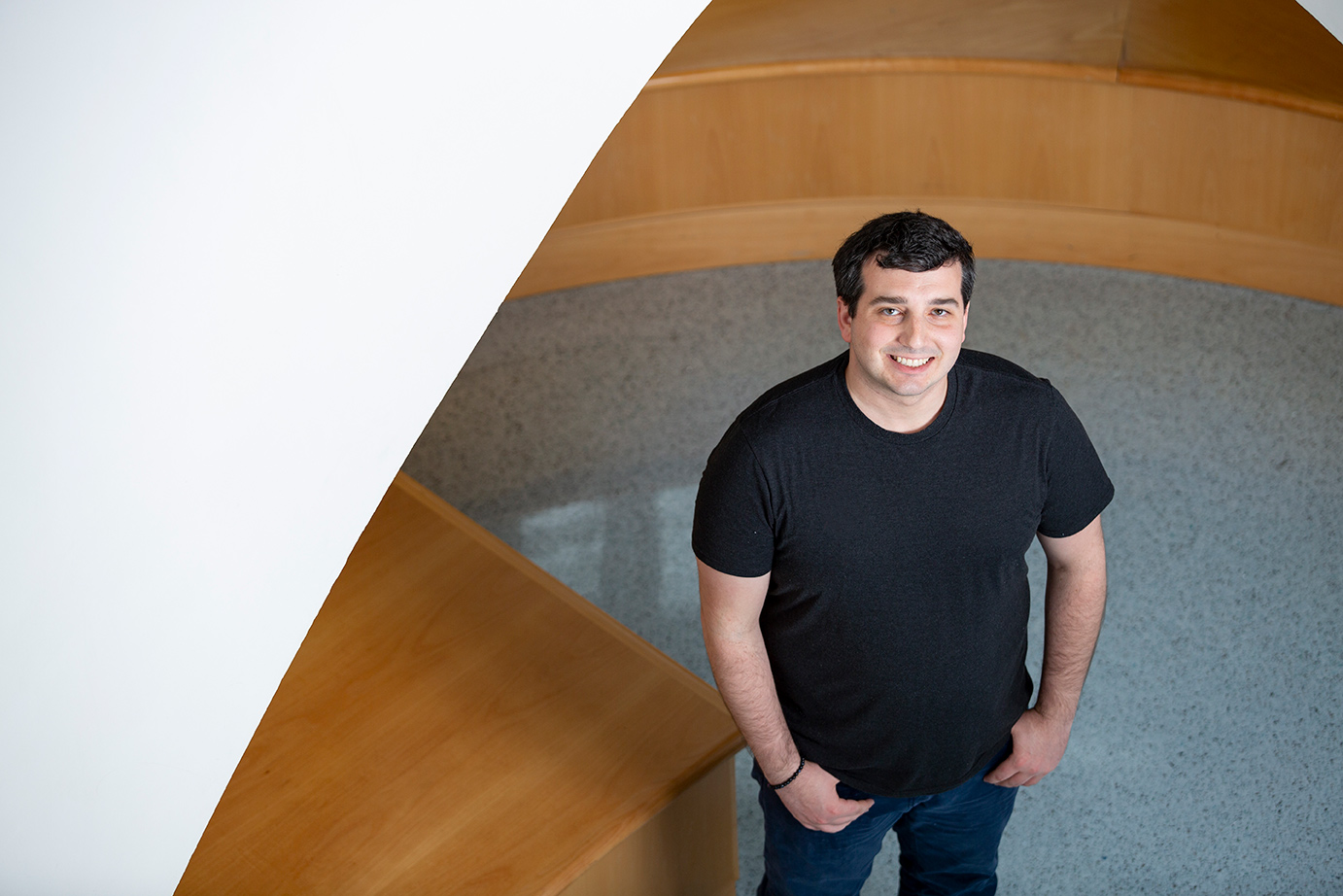Student-Designed Applied Practice Experience Projects Steer the Models for Achieving Real Change in Health and Healthcare
From Day 1, students in Dartmouth's online/on-campus hybrid Master of Public Health Program immediately impact their careers, organizations, and communities through experiential learning work. Explore how four students designed and executed their practicum (applied practice experience) projects to achieve real change in health and healthcare right now. Their work is influencing the models for improving access to gene therapy for treating rare conditions, optimizing the design of primary care teams, eliminating stigma around HIV, and advocating for universal access to healthcare.
Leading the Model for Change: Making Gene Therapy Treatment Affordable and Accessible
Lauren Masterson-Rodriguez MPH'20

Gene therapy is an emerging technique that uses genes to treat or prevent diseases like inherited retinal disease or spinal muscular atrophy. An estimated 30 million people in the U.S. suffer from these rare conditions and could benefit from gene therapy to treat and cure their conditions. However, the costs for the therapies are exceedingly high, ranging up to $2.1 million per patient. Due to the costs, there are concerns about patient access to these therapies, and the likelihood that employers and health insurance plans will be able to provide coverage for these therapies.
Lauren Masterson-Rodriguez’s practicum work centered on running an industry-first project called Embarc Benefit ProtectionSM to help make gene therapy accessible and affordable for both patients and insurance plans.
Announced last fall, Embarc Benefit Protection is designed to allow employers and plans to pay a low, per-member-per-month fee to be part of gene therapy network. When a member of their benefit plan needs a gene therapy that is part of the network, they can access without any out-of-pocket payments related to the cost of the medicine.
There are two gene therapies that are part of the network currently:
- Luxturna™, the first FDA-approved prescription gene therapy for people with inherited retinal disease, and
- Zolgensma®, a gene therapy for children under two years old with spinal muscular atrophy.
Additionally, patients and their families will receive personalized and expert care to assist them through their health journey. The path to the creation of Embarc Benefit Protection was managed by Masterson-Rodriguez who works at Ascent Health Services, a pharmaceutical group purchasing organization that is part of Express Scripts. Cigna Corporation is Express Scripts parent company. Steve Miller, MD, executive vice president and chief clinical officer for Cigna, placed Masterson-Rodriguez in charge of managing Embarc Benefit Protection’s design, seeing that it would be an ideal fit for her practicum project.
“Dr. Miller has been a mentor and a champion for me as I navigate my career at Cigna and Express Scripts,” says Masterson-Rodriguez. “As a result of this project, I have been able to make new connections throughout the organization in areas that I would not have been exposed to otherwise.”
Masterson-Rodriguez created the Embarc Benefit Protection project framework. She worked closely with the leadership teams at Cigna and Express Scripts, identifying and working with finance, underwriting, clinical, legal, marketing, and sales departments, to create a payment model for therapies that is like no other in the industry.
“The health care system and payment models in place today are structured to support chronic conditions," says Masterson-Rodriguez. "The system is not designed to pay for curative therapies like gene therapy. Embarc Benefit Protection addresses a critical need facing the entire health care system, delivering better care, affordability and access.”
Career Impact:
I recently took on a new role at Cigna as Vice President, Pharma Contracting and Strategy in part because of the practicum experience through the MPH program. I am thankful to the Dartmouth faculty and staff for investing time in helping me evolve my practicum work into new professional opportunities.
Leading the Model for Change: Working with the Community to Eliminate HIV-Related Stigma in Hawaii
Stuart Watson MPH'20

Stuart Watson’s practicum work is at the heart of the Hawaii 2 Zero initiative to end the AIDS epidemic across the state. The need is especially important for Native Hawaiians/Pacific Islanders (NHPI), who are diagnosed with AIDS at a higher proportion than any other racial/ethnic group in Hawaii and compared to NHPIs in the United States overall. For Watson, the key to ending the AIDS epidemic is being able to diagnose people earlier in the stages of HIV infection, linking them to treatment, and getting them virally suppressed. However, a barrier to these efforts is overcoming the negative attitudes and beliefs about people living with HIV.
“Really, we just have to find the last few who aren't diagnosed or aren't on treatment, which begs the question, why haven’t they been diagnosed yet, or why don't they stay on treatment?” says Watson.
Some of those answers came from the work he did in conducting focus groups with the community to understand how people living with HIV, and people who are at risk for HIV, experience stigma. The work was part of the Zero HIV-related Stigma Subcommittee that he led with the Hawaii Department of Health’s Community Planning Group in his role as an HIV care program specialist. Participants expressed the concerns they encountered from family and friends, including fear of infecting others, even if just washing their clothes together, as well as their own feelings of uneasiness in disclosing to friends and family due to stigma. Watson says there was widespread consensus that the best way to eliminate stigma is to prevent it from starting by talking openly about HIV and its risk factors, beginning at an early age.
“The general public doesn't really know about HIV anymore because it isn't in the news like it was at the beginning of the epidemic,” says Watson. “It's no longer a death sentence, and it's even more easily managed than diabetes or hypertension. With general and widespread knowledge about it, I believe the pressure and stigma around it will go away.”
The focus groups’ findings will be incorporated into Hawaii’s State Plan and will include recommendations to develop programming for schools, churches, and recreational areas to promote open dialogue.
Career Impact:
The work I did through my practicum and the MPH program helped me get a position with the Department of Defense's HIV/AIDS Prevention Program (DHAPP). I am now working on HIV prevention and care in a global health setting, remotely managing on-the-ground programs in six countries in Africa from DHAPP's headquarters in San Diego. My MPH experience gave me the program management skills that are necessary to do this job.
Leading the Model for Change: Shaping the Path to Universal Primary Care for Oregon
Jessica Hensley MPH'20

In her career as a registered nurse in Oregon, Jessica Hensley has spent a lot of time in an outreach/advocacy role to help coordinate care for patients. When she worked as an RN complex care manager at a federally qualified health center clinic in downtown Portland that served primarily homeless and low-to-no-income patients, she saw firsthand the barriers they face to getting the care they need. It drives why she is passionate about promoting access to equitable healthcare both in Oregon and nationally.
“I knew going into my practicum search that my number one choice was to participate in healthcare policymaking and advocacy at the state level,” says Hensley. “Thinking it may be a ’stretch’ goal, I cold emailed my district’s House Representative. He then connected me with one of his colleagues, Representative Rachel Prusak, who sits as a member on the House Committee on Health Care.”
The timing was ideal for Rep. Prusak – a nurse practitioner herself – who had just written a bill requesting a task force to study Primary Care Trust (PCT) policy within Oregon. PCT is a payment model designed to achieve state-based universal coverage for primary care services. It would stabilize and streamline payment for primary care services by consolidating all the existing primary care funding sources into one place. Prusak’s team invited Hensley to join their efforts to advance this legislation. As part of her practicum work, she researched and compiled a report examining Oregon’s contextual considerations for a PCT policy approach. She analyzed County Health Rankings data and found that life expectancy is higher and self-reported health status is better for Oregonians with enhanced access to primary care. She also conducted a financial analysis and business case for piloting PCT policy in Oregon with promising results.
Hensley’s work carried important implications for charting the path forward, and the House Committee on Health Care asked her to testify for the committee regarding the national context of other states that have also explored PCT policy.
The impact of Hensley’s work continues to grow. After Hensley completed her practicum work, Rep. Prusak invited Hensley to participate in Oregon’s Universal Access to Primary Care legislative workgroup to help develop policy proposals for advancing legislation on improving access to preventive healthcare. Throughout summer and fall 2020, Hensley volunteered as Prusak’s behind-the-scenes health policy consultant for the workgroup. “It has been really exciting because Rep. Prusak has utilized my analyses and data I gathered for my MPH integrative learning experience (ILE) thesis work on policy that enhances equitable access to primary care,” Hensley says. Rep. Prusak has now formalized Hensley’s role on the team and hired her as the health policy legislative analyst to Prusak, who currently chairs Oregon's House Committee on Healthcare.
Career Impact:
My biggest takeaway from the MPH program is a sense of empowerment—believing that I have the tools, knowledge, and skillset to truly make positive impacts on health and healthcare within my community and state. I look at system-level problems around me with a new lens now: How could we measure this? Who do we need at the table? What positive changes can we create?
Leading the Model for Change: Optimizing the Design of Primary Care Teams to Improve Value-Based Care
Matthew Sangphet MPH '20

As a healthcare management consultant, Matthew Sangphet has worked with hospitals and healthcare systems across the U.S. to bridge the gap between clinical innovations in patient care, complex healthcare data, and organizational growth. His current focus is on optimizing the design of primary care teams at Mayo Clinic, one of the world's largest integrated, not-for-profit medical group practices.
“To date, research on primary care staffing models has focused on team-based transformational models of primary care to meet the triple or quadruple aim for optimizing health systems,” says Sangphet. “However, there is little advancement in care team staffing configurations and ideal practice models required to deliver high quality, low cost, comprehensive primary care.”
A team-based care model brings together a multidisciplinary team of clinicians, nurses, allied health staff, and other specialized staff who work together to ensure patients’ needs are met in the safest, most effective, and most efficient way possible. An optimized care team establishes how each member of the team can add the most value to direct patient care while diversifying the relationships and touchpoints a patient has with their clinic and improving patient care and outcomes.
At the Mayo Clinic, Sangphet developed an Excel-based primary care staffing tool that is designed to provide optimal clinical staffing ratios for primary care sites that are scalable based on patient populations and geographies. The model incorporates panel capacity considerations, potential care team efficacy metrics, and care team factors. Key drivers include care team composition, service area population dynamics, provider panel sizing, service area payor mix, and provider revenue and expense drivers.
“This model will help guide leadership and administrators to an optimal state for primary care staffing with existing and future sites,” says Sangphet. “It will also provide a useful forecast framework for primary care team composition and site strategy."
Career Impact:
Primary care is one of the highest priorities for health systems today for improving care and patient outcomes. My practicum work has provided me the opportunity to impact healthcare delivery at a leading academic health system and develop a model to help leaders successfully manage planning and decision-making related to primary care teams. With continuous refinements and iterations, we are planning to pilot and distribute the model enterprise-wide at Mayo.
POSTED 2/10/2020 AT 01:08 PM IN #news #education #practicum
GET IN TOUCH
To arrange a media interview, please contact:
geisel.communications
@dartmouth.edu

